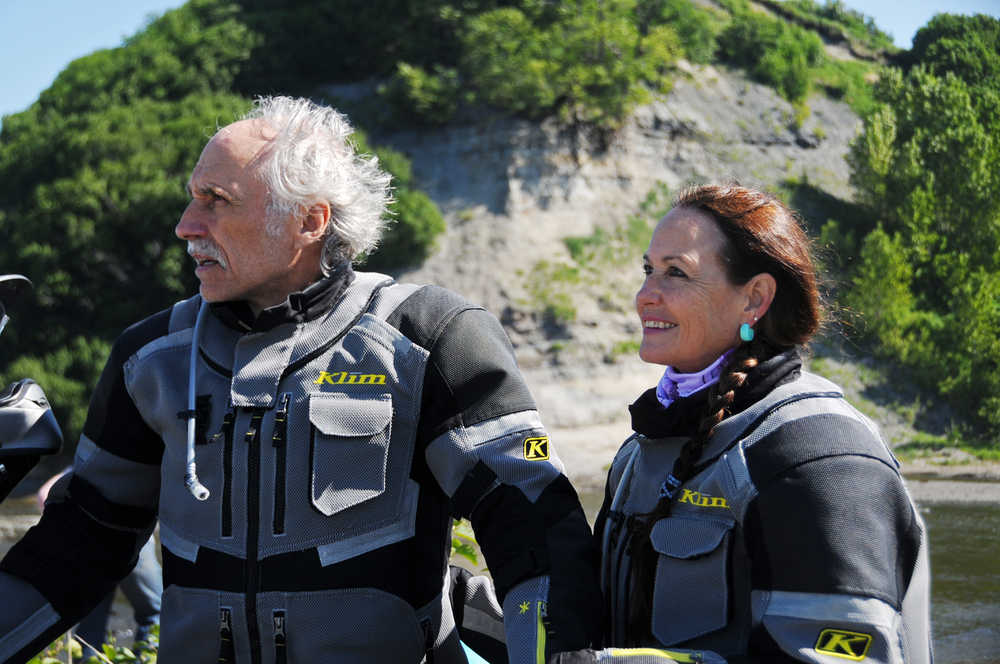Randy and Lana McKinney are packing light on the backs of their motorcycles, even though they’re not planning to return home anytime soon.
The Kenai Peninsula couple plans to leave their home near Ninilchik this July and cross 86 countries on their motorcycles, treating children with dysentery as they go. The couple, who have lived in Alaska for about 14 years, said their journey will probably take at least three to four years.
They chose to focus on dysentery because Randy McKinney has developed a compound he says can stop dysentery in its tracks. Dysentery, a widespread bacterial disease that typically causes intestinal inflammation, dehydration and often death, can take multiple forms and typically causes severe diarrhea. Diarrhea kills approximately 2.2 million people worldwide each year, according to the World Health Organization.
The disease is frequently carried in water. The couple said one of their goals, besides providing medical treatment for sick children, is to educate them on health care and to provide clean water for them.
“People will sometimes ask, ‘Well, why don’t they just dig a well?’” Randy McKinney said. “Well, they may not have a shovel … and it’s 50 miles to the nearest store where they can get a shovel.”
Randy McKinney, who is a trained homeopath, said he wants to provide medical care to people who really need it.
“It’s going to be very rewarding,” he said.
The idea for the journey came when the couple discussed their relationship to their possessions, Randy McKinney said. They felt owned by their things rather than the other way around and were looking for something rewarding to do next, he said.
“So I asked Lana if she’d be interested in a trip like this,” Randy McKinney said. “Her answer was, ‘My bags are already packed.’”
Lana McKinney was on her sixth motorcycle ride ever Saturday in Ninilchik. It takes some getting used to — the controls are a little more “squirrelly”— but she’ll be ready by their target departure date of July 15, she said.
“I grew up on horses,” Lana McKinney said. “It takes a little getting used to.”
They plan to leave Alaska and drive south all the way through South America, turning north and eventually boarding a ship in Rio de Janeiro, taking their motorcycles across to Europe.
They plan to cross the Sinai Peninsula in Egypt, circulate the outer countries of Africa, travel all the way to the northern border of Finland, cross Russia and India and eventually return to Alaska.
They are still looking for another couple, preferably with medical experience, who could travel with them on the expedition, they said.
Currently, it is just the two of them, but they would be open to having others who would travel with them for even just a leg of the journey, Lana McKinney said. Randy McKinney said he did a dry run earlier this year with a trip from Arizona back to Alaska, testing out what he really needed for the trip.
There may be some changes of plans, though, given geopolitical circumstances in various countries, Randy McKinney said.
“We had originally planned to come back to the U.S. (before sailing to Europe), but we can’t cross through Venezuela,” he said. “It’s just upside down right now. It’s unimaginably bad.”
The couple will stay updated through a Satellite phone, observations and what they hear, he said.
Lana McKinney said they are not afraid, only excited. The expedition will give them a chance to reach out to people who need medical help immediately, which they can provide.
One major motivation is the couple’s faith. Both are Christians and said they felt God was leading them to take this trip. Lana McKinney said she wasn’t afraid of the risks, even though some people had expressed fear for them.
“We could fear all kinds of things — we could fear drowning in the river today,” Lana McKinney said. “But we still move forward in faith. Fear is not of God. We stand against the fear that people try to project for us.”
A question that remains is how they will transition when they come back. Randy McKinney said he has heard stories of missionaries that returned and had difficulty adjusting back to normal American life. He said he has been reading about how other missionaries have returned, but it will likely be an adjustment of its own.
“What do we do for an encore?” McKinney said. “I’m not going to just sit in a rocking chair and wait to die.”
The two have chosen to call their trip the Travessilla Expedition. The term is an old Vaquero word that translates to, “to take another or a different route.”
More information about the McKinneys’ travels is available on their website, travessillaexpedition.org.
Reach Elizabeth Earl at elizabeth.earl@peninsulaclarion.com.

